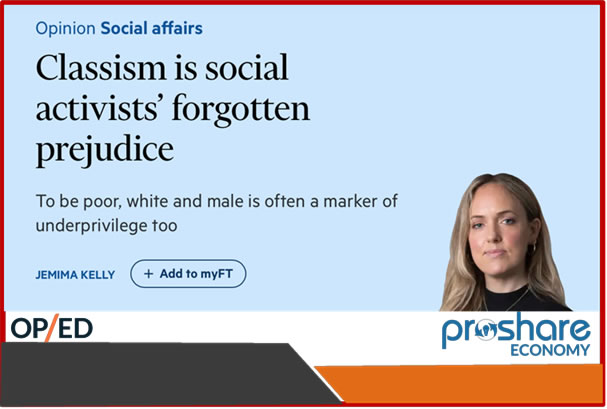As a keen football fan, I was drawn to Simon Kuper’s article published in the 24 November 2022 FT edition titled, “I’m in Qatar. But the real World Cup happens back home.” I was intrigued after reading, “Everyone is hunting that rare beast: the actual committed fan. What was a source of fear in 1990 is now the World Cup’s chief selling point. A smattering of them flies in each day: typically, the upper-middle class of rich countries, the English skilled working class and the upper class of poorer countries. Ecuador’s fans, for instance, are much whiter than Ecuador’s team.” Kuper’s article would suggest there is a correlation between colour and class where the so-called upper-middle class is white and non-white translates to a so-called lower class. This will not be the first or the last time that Financial Times has referenced class. In the previous twenty years, I have read the Financial Times almost daily and noticed a pattern where class has often been an overriding factor. In many instances, class has become the adjective to modify the noun.
I will discuss two related themes in this letter addressed to the FT editor, leadership and columnist. The first is the symptom of FT’s fixation with class, and the second is the possible cause of this fixation. According to the Social Mobility Commission, “Parental occupation is the most accurate measure available to assess socio-economic background.” In several write-ups in the FT, columnists habitually invoke the parental occupation of the subject. I will highlight some of these instances in the next couple of lines.
In an article titled, ‘René Benko: Austrian property billionaire thrust into the limelight’ published in the 21 October 2022 FT edition, the writer wrote, “His father worked for the city council, and his mother was a kindergarten teacher.’ In a 15 March 2021 article titled, ‘Macron’s interior minister confronts Le Pen on her own territory,’ the author wrote, “His father ran a bar, and his mother was a cleaning lady — all of which makes him an advertisement for France’s attempt to assimilate immigrants from its former north African colonies.” In an article titled, ‘Why conservatives have faith in Amy Coney Barrett’, the writer wrote, “Her father was a lawyer at Shell Oil, while her mother was a homemaker.” In an interview with Krystsina Tsimanouskaya, the author wrote, “Her father was a fireman, now retired, and her mother still works at a bank.” In an article titled, ‘Playing the long game: Nancy Pelosi’s heir apparent Hakeem Jeffries set to make history,’ the author wrote, “Jeffries was born and raised in Brooklyn, New York, where his mother was a social worker, and his father was a substance abuse counsellor.” In an article about PJ O’Rourke, published in the 18 February 2022 FT edition, the author wrote, “His mother was a housewife (later a school administrator) and his father a car salesman.”
Additionally, there are many instances where the socio-economic background of the subject is specifically mentioned. For example, in an article about Xiang Guangda written on 11 March 2022, the author wrote, “Born into a working-class family in Wenzhou, a buzzing city in the coastal Zhejiang province renowned for turning out some of China’s most famous entrepreneurs.” In an article captioned, ‘Nicolás Maduro, Venezuela’s lord of misrule,’ the writer stated, “Born into a working-class Caracas family, one of four children, he became a militant rather than graduating from high school.” In a 22 December 2015 article titled, ‘V. S. Gaitonde: Painting as Process, Painting as Life,’ the author wrote, “Although he was born into a working-class family in Nagpur, western India in 1924, Vasudeo Santu Gaitonde (known as V. S.) succeeded in winning a place at the JJ School of Art in Bombay.” In ‘Man in the News: Mario Draghi’ published in the 29 April 2011 FT edition, the author wrote, “Born into a middle-class family in Rome, Mr Draghi had lineage at the Bank of Italy, where his father also worked. His mother was a chemist.” In reviewing Vieux Farka Touré’s album, the author wrote, “Vieux Farka Touré’s father never wanted him to be a musician. This was not surprising given that his father was a middle-class West African farmer and local politician.” In an article titled, ‘Is Jos Buttler the future of cricket?’, the author wrote, “Joseph Buttler was born into a middle-class family in Taunton, Somerset. He always dreamt of playing for England.”
From the above, there is an apparent fixation with class. The FT has slipped into an overuse of parental occupation, which has no relevance and does not enhance the reader’s experience nor add value to the story. All it does is show the reader the socio-economic background of the subject. I appreciate that the UK is a class-based society, but over-egging class in the face of your readers smacks of classism. When the FT references the subject’s parental occupation without even mentioning the parent’s name, it dehumanises the subject’s parents and relegates them to beast of burdens. If you think what I am writing makes no sense, can I suggest replacing the reference to your subject’s parental occupation with their parent’s race? I am sure the editorial team will find it absurd if a columnist writing an article about, say, ex-chancellor Kwasi Kwarteng states, “Kwarteng’s father is a black man, and his mother is a black woman,” or “Boris Johnson was born into a white family.” May I suggest you review your editorial guidance on class overuse in your reporting?
Now to the second part of the letter. As I mentioned, the UK operates a hierarchical class structure with the so-called upper class at the top of the pyramid and the so-called lower class at the bottom of the class totem pole. Since Financial Times is a product of its environment, it would not be surprising to see some of these traits seeping through its pages and corridor. In October 2018, I wrote a letter to the FT addressing the lack of diversity in colour, opinion and experience. At the time, I highlighted that of the 861 articles written by FT columnists between January to October 2018, no article was written by a black columnist. Since I wrote that letter, FT has taken some steps to make it more inclusive. There are more articles written by people of colour. There are at least two black columnists, and you have appointed a head of newsroom diversity to advance diversity in editorial coverage and promote diverse hiring practices. So far, so good. However, in my earlier letter, I overlooked the imbalance in the schools attended by the FT’s most prominent columnists.
In his book The Establishment, Owen Jones notes, “Because the media disproportionately recruits from such a privileged layer of British society, there are inevitable consequences for how journalists look at news stories, or how they decide what issues are priorities.” According to Elitist Britain 2019, published by Sutton Trust and the Social Mobility Commission, “The media also has some of the highest numbers of privately educated people. Of the 100 most influential news editors and broadcasters, 43% went to fee-paying schools. Similarly, 44% of newspaper columnists were privately educated, with a third — 33% — attending both an independent school and Oxbridge.” My hypothesis (you could call it my conspiracy) is that FT’s fixation with class stems from the fact that most of its high-profile columnists and editors attended the UK’s most elitist educational institutes. The FT employs “More than 2300 people worldwide, including 700 journalists in 40 countries,” however, the core columnists, who are known worldwide and whose write-ups we read daily, predominately attended either Oxford or Cambridge. In contrast, non-Oxbridge graduates are often relegated to correspondents and other backroom duties. So by the time one reads the FT from cover to cover from Monday to Sunday, one would have read the opinion or writings of its ‘elite Oxbridge columnists’.
Please permit me to turn the FT’s logic of referencing parental occupation and class on its head by referencing the weekly reading experience of an FT subscriber.
On Monday, Leo Lewis, the Asia Business Editor who attended Oxford, will keep you abreast with what is happening in Japan. On Tuesday, Martin Sandbu, the Oxford-educated European economics commentator, provides insights into the intersection of economics, politics and ethics. On Wednesday, you will read the opinion of Martin Wolf, the Oxford-educated Chief Economic commentator. In her Thursday column, Sarah O’Connor, the Cambridge-educated Employment Columnist, provides a detailed analysis of the world of work. Oxford-trained Alan Beattie, the Senior Trade Writer, informs us on the same day about trade and globalisation. On Friday, you read the views of US-based Editor at Large Gillian Tett, who attended Cambridge University. To learn about what is going on in Africa, there is David Pilling’s African Editor, who attended Cambridge to help your understanding. Every Saturday, you can be enlightened by contributing editor and Oxford-educated Camilla Cavendish’s in-depth analysis.
When you are tired of finance and economics and want to read about sports, you can read Simon Kuper, the Oxford-trained sports columnist. To gain investment insight, there is always Stuart Kirk, the investment columnist, who attended Cambridge to educate you. You can read Henry Mance, the Oxford-educated FT’s chief features writer’s humour-laced pieces for a good laugh. Oxford-trained John Thornhill, the FT Innovation Editor, will get you up to speed with the latest news and thinking on technology. If you want to improve your economic understanding, you can read Oxford-educated Tim Harford’s Undercover Economist column. Cambridge-trained Gideon Rachman, the chief foreign affairs columnist, will keep you informed about what is happening in international affairs. There is Oxford-educated Stephen Bush’s write-up for profound social affairs commentary to help your understanding. Oxford-educated John Gapper’s weekly column will help you understand business and society from a consumer perspective. Cambridge-educated Chris Giles’s fortnightly column aids our understanding of UK economic affairs. Miranda Green, the Cambridge-trained Deputy Opinion, informs us about personal productivity. Oxford-educated Helen Thomas tells us about British business and finance through her weekly columns. Tony Barber, the Oxford-educated European comment editor, aids our understanding of what is happening in Europe. Cambridge-educated Elaine Moore, the FT’s Lex column deputy editor, provides us with commentary on the technology industry. Twice every month, Cambridge-educated Mohamed El-Erian provides us with cerebral market insight. In addition, Cambridge-educated Merryn Somerset Webb keeps us educated on personal finance and investments. John Plender, the Oxford-educated senior editorial columnist, keeps us educated with his insightful market analysis. Cambridge-educated Andrew Hill, the FT’s Senior Business Writer, helps us understand management and business. Stephen Morris, the Oxford-trained banking editor, keeps us updated with happenings in the world of banking. Every month, Megan Greene, the Oxford-trained economist, keeps us abreast with developments in the global economy. Finally, Emma Jacobs, the Cambridge-educated features writer, informs us about office life and career change.
In November 2019, the world applauded as Roula Khalaf was appointed the first female editor since the FTs founding in 1884. Having a British-Lebanese female editor might give the paper a veneer of inclusivity, but in reality, there is no diversity of thought. When most of the columns in one of the world’s most prominent papers come from people who went to either Oxford or Cambridge, it tells us much about where the paper stands regarding social mobility. Moreover, the overrepresentation of Oxbridge voices could constitute a form of pseudo-censorship whereby the voices of non-Oxbridge graduates are silenced. What is the point of going to any other school if the FT only showcases the voices of its Oxbridge elite forces? It may be time for the Financial Times to be re-christened to Oxbridge Times.
One should not be surprised why people have lost confidence in the mainstream media and see them as part of the establishment, which is not representative of its readership. The above examples demonstrate that the FT is elitist at best and out of touch at worst. Please read what I have written with an open mind and put structures in place to break down the walls of classism.
Many thanks.
Selah.
About the Author
Ahmed Olayinka Sule is a CFA Charterholder, photojournalist and social critic. He is an Alumnus of the University of Arts London, where he obtained a Certificate in Photojournalism. He has also worked on various photojournalism projects and can be contacted via e-mail at [email protected] Twitter @Alatenumo
 Lagos, NG • GMT +1
Lagos, NG • GMT +1











 448 views
448 views











 Sponsored Ad
Sponsored Ad
 Advertise with Us
Advertise with Us









